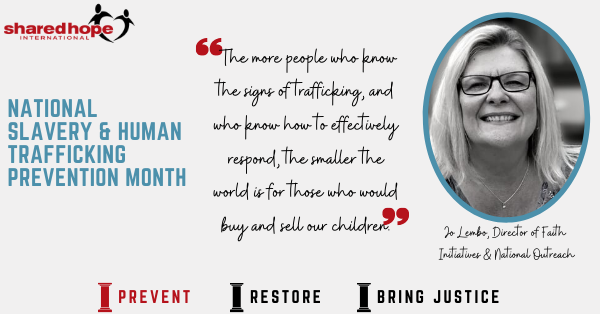By Jo Lembo, Director of Faith Initiatives & National Outreach

You are the key to Shared Hope’s success in fighting child and youth sex trafficking.
Shared Hope pursues a strong Prevention program to help you educate others.
The more people who know the signs of trafficking, and who know how to effectively respond, the smaller the world is for those who would buy and sell our children.
Through the years we have heard our audiences ask, “But what can I do?” and that question is the basis of our strategies. Faith Initiatives, the Ambassadors, and the Defenders all walk alongside you with practical training, toolkits, and resources to shine the light into the darkness. Building on your skills, interests and influence, we create materials that help you build a foundation of understanding that leads to taking action, and that results in a safer community.
Awareness begins in the home, in schools, communities, and churches. Shared Hope supports you with the basic building blocks to be proactive in educating those around you so they know,
- what trafficking looks like,
- what makes kids vulnerable,
- what are the tactics of predators or pimps, and
- how to respond effectively.
Growth Strategies reaches out to inform you through informational newsletters and podcasts to strengthen your resolve to continue to fight side-by-side with us. We help you understand the important part each of you has in protecting children. Your friendship and partnership with Shared Hope is vital to the work we do.
Through training webinars and conferences, Shared Hope offers programming with firsthand conversations with trained professionals, who share their experience along with powerful stories, that equip audiences to understand how to stop trafficking through prevention education. We draw speakers from not only licensed professionals, but also individuals with learned experience, and those who are providing direct services to survivors so they can thrive.
It’s simple: the more you know, the safer kids are.
Our policy team at the Institute for Justice and Advocacy is a strong influence in state and federal legislation that insures provision and protection measures for victims and survivors of trafficking. Working parallel to our awareness programs, we understand the importance of educating professionals such as law enforcement, judges and prosecutors, social workers, and many others who all come into contact with the victims of trafficking. This is why we’ve added an entire section to our Report Cards on Child & Youth Sex Trafficking designed to encourage mandated trainings for key stakeholders and students. Those laws with an educated public, form a strong safety net to ensure the kind of care that gives hope to survivors that they can find a bright future.
Together, we will prevent commercial sex trafficking…one life at a time.
Take Action –
Now that you have read about the importance of prevention work in the fight against human trafficking, here are a few take action steps:
- Send the Report Cards on Child & Youth Sex Trafficking to your elected officials
- Become a Grassroots Hero to receive updates on legislative initiatives, campaigns and urgent calls-to-action.
- Check out our Advocacy Action Center
- Sign up for our Weekend Warrior newsletter for 15 minutes of action each week.
- Follow us on Social Media on Facebook, Instagram, Twitter and LinkedIn.
- Join us as a trained volunteer, equipped to educate your community as an Ambassador of Hope or Defender.
- View some of our Prevention focused webinars like:
- Take our Domestic Minor Sex Trafficking 101 e-learning course






